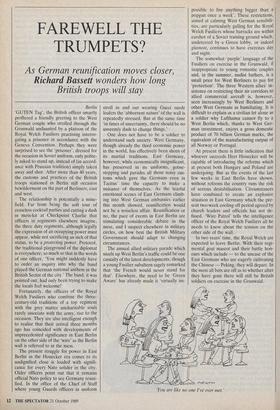FAREWELL THE TRUMPETS?
As German reunification moves closer,
Richard Bassett wonders how long
British troops will stay
Berlin `GUTEN Tag', the British officer smartly proffered a friendly greeting to the West German couple who strolled through the Grunwald undaunted by a platoon of the Royal Welch Fusiliers practising interro- gating a prisoner in accordance with the Geneva Convention. Perhaps they were surprised to see the 'prisoner', dressed for the occasion in Soviet uniform, only polite- ly asked to stand up, instead of (in accord- ance with Prussian tradition) simply taken away and shot. After more than 40 years, the customs and practices of the British troops stationed in Berlin still occasion bewilderment on the part of Berliners, east and west.
The relationship is potentially a mine- field. Far from being the soft tour of ceaseless cocktail parties and cutting a dash in mess-kit at Checkpoint Charlie that officers in regiments elsewhere imagine, the three duty regiments, although legally the expression of an occupying power must appear, while not sacrificing an inch of that status, to be a protecting power. Protocol, the traditional playground of the diplomat is everywhere; so much so that in the words of one officer, 'You might suddenly have to order an inquiry into why the band played the German national anthem in the British Sector of the city.' The band, it was pointed out, had only been trying to make the locals feel welcome!
Fortunately, the officers of the Royal Welch Fusiliers who combine the three- century-old traditions of a top regiment with the grey matter uncharitable souls rarely associate with the army, rise to the occasion. They are also intelligent enough to realise that their arrival three months ago has coincided with developments of unprecedented significance in East Berlin on the other side of the 'wire' as the Berlin wall is referred to in the mess.
The present struggle for power in East Berlin as the Honecker era comes to its undignified close is loaded with signifi- cance for every Nato solider in the city. Older officers point out that it remains official Nato policy to see Germany reuni- fied. In the office of the Chief of Staff where young Guards officers in uniform stroll in and out wearing Gucci suede loafers the 'abhorrent nature' of the wall is repeatedly stressed. But at the same time 'in times of uncertainty, there should be no unseemly dash to change things.'
One does not have to be a soldier to understand such anxiety. West Germany, though already the third economic power in the world, has effectively been shorn of its martial traditions. East Germany, however, while economically insignificant, has preserved in its uniforms, gobse- stepping and parades all those noisy cus- toms which gave the Germans even in Tacitus' time the capacity to make a nuisance of themselves. As the tearful emotional scenes of East Germans climb- ing into West German embassies earlier this month showed, reunificatipn would not be a noiseless affair. Reunification or no, the pace of events in East Berlin are stimulating considerable debate in the mess, and I suspect elsewhere in military circles, on how best the British Military Government should adapt to changing circumstances.
The annual allied military parade which snarls up West Berlin's traffic could be one casualty of the latest developments, though a young Fusilier subaltern sagely remarked that 'the French would never stand for that'. Elsewhere, the need to be 'Green Aware' has already made it 'virtually im-
possible to fire anything bigger than a popgun once a week'. These restrictions, aimed at calming West German sensibili- ties, are particularly galling for the Royal Welch Fusiliers whose barracks are within earshot of a Soviet training ground which, undeterred by a Green lobby, or indeed glasnost, continues to have exercises day and night.
The somewhat 'purple' language of the Fusiliers on exercise in the Grunwald, if inappropriate to young romantic couples and, in the summer, nudist bathers, is a small price for West Berliners to pay for 'protection'. The three Western allies' in- sistence on restricting their air corridors to allied commercial aircraft is, however, seen increasingly by West Berliners and other West Germans as humiliating. It is difficult to explain as a civilian let alone as a soldier why Lufthansa cannot fly to a West Berlin which, thanks to West Ger- man investment, enjoys a gross domestic product of 70 billion German marks, the equivalent of the manufacturing output of all Norway or Portugal.
At present there is little indication that whoever succeeds Herr Honecker will be capable of introducing the reforms which at present both Hungary and Poland are undergoing. But as the events of the last few weeks in East Berlin have shown, without reforms the country runs the risk of serious destabilisation. Circumstances have combined to create an explosive situation in East Germany which the pre- sent two-week cooling off period agreed by church leaders and officials has not de- fused. 'Wire Patrol' tells the intelligence officer of the Royal Welch Fusiliers all he needs to know about the tension on the other side of the wall.
In two years' time, the Rdyal Welch are expected to leave Berlin. With their regi- mental goat mascot and their battle hon- ours which include — to the unease of the East Germans who are eagerly cultivating the Chinese — Peking, they will depart. In the mess all bets are off as to whether after they have gone there will still be British soldiers on exercise in the Grunwald.
`You are like no one I've ever met.'


























































 Previous page
Previous page